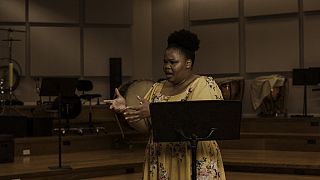Colombia
She grew up in a needy port on Colombia's Pacific coast to the rhythm of drums, marimbas and the echo of violence. Although in Buenaventura she never heard an opera, today Betty Garcés seduces the world as one of the most important Afro sopranos in Latin America.
With a sweet smile and gentle conversation, the 39-year-old woman never aspired to the success that led her to live in Germany since the winter of 2009 and sing on stages in more than twenty countries.
"I never imagined it would happen to me, because unfortunately the environment in which I grew up in Buenaventura did not give me many opportunities to dream," says Garcés in conversation with AFP at the Teatro Colón in Bogotá.
Framed in a lush jungle on the shores of the Pacific Ocean, its cradle of some 315,000 inhabitants is Afro (91%), battered by poverty (41%), unemployment (18%) and drug trafficking violence.
Their parents, a math teacher and an artist, encouraged their daughters to migrate to the nearby city of Cali, although they would understand only "years later their reasons".
"We are three sisters and each of us was sent to Cali to live when we were 14 years old to protect us (...) the environment was changing, it was becoming aggressive" in Buenaventura, confesses the singer in black clothes that contrast with the red of an indigenous necklace around her neck.
The single and childless artist first studied at the conservatory in Cali, but her talent moved one of her teachers who was determined to arrange a German scholarship.
A specialist in lied, concerto, chamber music and opera, her voice has reached prestigious stages such as the Parco della Musica in Rome, the Teatro Real in Madrid, the Gulbenkian Hall in Lisbon, the Prince Mahidol Hall in Bangkok and the church of St. Eustache in Paris.
But reaching the pinnacle of lyric singing has earned him more than one battle.
"In this system there tends to be a lot of pigeonholing, there are many molds (...) As for the issue that I am a black woman, I am a Latina or American woman, I am a plus-size woman, large-framed, and I sound and look very different from what they expect."
-From crying to singing
Cumbias, currulaos, arrullos, salsa and other African-influenced rhythms vibrate in every corner of Buenaventura, but professional training is scarce.
Garcés discovered her artistic sensitivity as a child thanks to her grandparents, one deaf and the other blind. She had difficulty communicating with the rest of her family and was bullied at school, so her grandparents' house became a refuge.
Her grandfather "played the harmonica empirically" and she, she recalls, would "lie on the floor, put her ear to amplify the sound" and "imagine she was in another world".
When her grandmother passed away she felt she was losing her "pole to earth" without suspecting that out of the weeping and desolation would emerge "a new language": music.
"I was left alone (...) in the midst of that mourning, of that difficult moment for a 10-year-old girl, losing her only love reference in life is very strong," she recalls.
But one day, in the midst of tears, "I started to moan" and "wordless melodies began to come out of that moan. It was my soul looking for an outlet for so much pain and so many emotions," she says, still emotional.
It is "the first moment where I have memory of a conscious singing and from that moment I began to sing and I did not stop," she concedes.
-A voice for others
Garcés' voice flies powerful in the capital's theater with Richard Strauss and the opera "Ariadne in Naxos".
With blonde wig and shiny dress, the singer hypnotizes and amuses with a parodic and critical piece about the theater world.
"Betty is a dreamlike Ariadne (...) splendid vocally and acting-wise," says director Joan Anton Rechi of Andorra.
In this version, Rechi mixes a classical tragedy with a popular flamenco show and places it in a party during World War II.
When Garcés makes the final bow the theater erupts in applause: "the affection with which the Colombian public receives you (...) makes you want to just spill out on stage," he says as his colleagues rehearse in the background wearing masks.
Today he looks back and is surprised that "despite the difficulties, somehow doors always open".
And if she tells her life story, it is "in the hope that some young" hesitant person will listen to her:
Because "if I were still that little girl I was, this story would give me the strength to try".











00:52
Jury deliberating in Sean ‘Diddy’ Combs’ sex trafficking trial
01:00
Animal shelters in the US use live music to soothe anxious pets
Go to video
Women redefine Gnaoua at Essaouira Festival
01:03
United Nations harnesses power of music for peace in South Sudan
00:52
Imprisoned singer R. Kelly alleges "murder plot" against him in prison
02:20
Slick Rick returns after 26 years with 'Victory' album